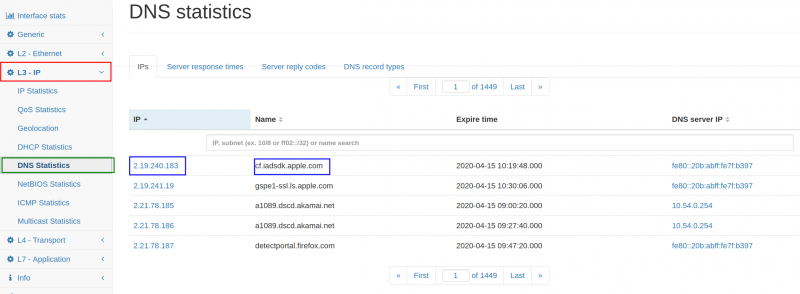DNS module
The DNS module tracks name lookup requests and responses to be able to present names for IP address without doing an active lookup. This allows the Network Multimeter to do efficient passive name resolving. The DNS module stores for each name the last IP that has been announced. Due to load balancing mechanisms in content delivery networks (or other setups) and virtual hosting, a name might be resolved
==ICMP module==to multiple IP addresses or a single IP address uses multiple names. The web frontend will always show the latest information seen on the network.
Web interface
IPs
This tab shows a table with all IP addresses and its name based on seen DNS request and response pairs. The Expire time column contains the date when the name is no longer valid. Usually DNS servers use a short timespan to let clients not store wrong names too long. The timespan usually ranges from a few minutes to some hours. The DNS server IP column lists the IP of the DNS server which responded to a query. Often, especially in smaller networks, there is only one server, but clients are free to use any other available DNS server.
Server response times
The response times tab shows global and per DNS server statistics about response times between a DNS request by a client and the response by the server. In the global section a graph shows minimum, average and maximum values over time. A table lists the amount of requests and responses, as well as response times per DNS server. A graph shows the amount of requests and responses over time.
Server reply codes
This tab shows reply codes globally and per DNS server in a list. Graphs show the distribution over time. The most common reply codes are shown:
- No error (0)
- Format error (1)
- Server failure (2)
- Non-existent domain (3)
- Other errors
DNS record types
This tab shows the amount of DNS record types globally for all DNS server. Detailed graphs are availble for the most commonly used record types A, AAAA, CNAME and MX
